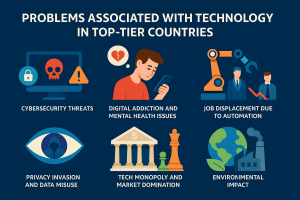
1. Cybersecurity Threats
Despite having advanced systems, top-tier nations are major targets for cyberattacks, ransomware, and data breaches. These attacks can cripple critical infrastructure, compromise national security, and result in massive financial losses.
2. Digital Addiction and Mental Health Issues
The overuse of social media, gaming, and mobile devices has led to increased rates of anxiety, depression, and social isolation, particularly among youth and young adults.
3. Job Displacement Due to Automation
As AI and robotics take over repetitive tasks, millions of jobs in manufacturing, customer service, and logistics are becoming obsolete, leading to unemployment and economic imbalance.
4. Privacy Invasion and Data Misuse
Tech giants often collect and exploit user data for targeted advertising and surveillance, raising ethical concerns around consent, transparency, and personal privacy.
5. Tech Monopoly and Market Domination
A handful of companies (like Google, Apple, Amazon, etc.) dominate the tech space, limiting competition, stifling innovation, and controlling access to digital services.
6. Environmental Impact
The rapid production and disposal of electronic devices contribute to e-waste, while massive data centers consume enormous energy, adding to global carbon emissions.
Proposed Solutions
1. Stronger Cybersecurity Policies & Global Collaboration
Governments should invest in AI-powered threat detection and enforce strict cybersecurity regulations.
Encourage global alliances to share threat intelligence and respond to cyber threats in real time.
2. Digital Wellness Education & Usage Limits
Schools and workplaces should include digital literacy and mental health education.
Tech companies must integrate features like screen time monitoring, usage alerts, and digital detox modes into devices and apps.
3. Upskilling & Reskilling the Workforce
Introduce government-funded retraining programs for workers at risk of automation.
Promote STEM education, especially in AI, robotics, and data science to prepare for the future of work.
4. Stronger Data Protection Laws
Enforce laws similar to the EU’s GDPR to protect user privacy and regulate how companies collect and use personal data.
Promote transparency by requiring companies to inform users how their data is being used.
5. Encouraging Fair Competition
Regulate monopolistic behavior through anti-trust laws and break up or decentralize companies that limit innovation or abuse dominance.
Support startups and open-source projects through funding and policy support.
6. Green Technology Initiatives
Invest in eco-friendly tech such as energy-efficient chips and recyclable electronics.
Encourage tech manufacturers to adopt sustainable practices and implement e-waste recycling programs.
- Conclusion
While technology in top-tier countries has accelerated progress, it also brings serious challenges. By implementing strategic, people-centered solutions—grounded in ethics, regulation, and innovation—these nations can lead the world into a more balanced, secure, and sustainable digital future.